Chad, officially the Republic of Chad, is a landlocked country in Central Africa. It borders Libya to the north, Sudan to the east, the Central African Republic to the south, Cameroon and Nigeria to the southwest, and Niger to the west. Due to its distance from the sea and its largely desert climate, the country is sometimes referred to as the "Dead Heart of Africa".
The Chad National Army consists of the five Defence and Security Forces listed in Article 185 of the Chadian Constitution that came into effect on 4 May 2018. These are the National Army (, the National Gendarmerie, the National Police, the National and Nomadic Guard and the Judicial Police.
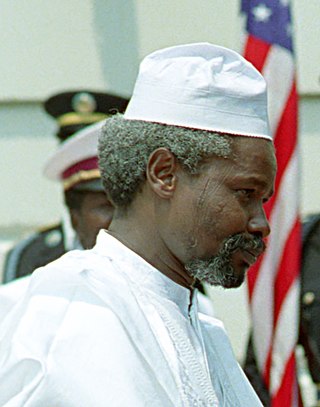
Hissène Habré, also spelled Hissen Habré, was a Chadian politician and convicted war criminal who served as the 5th president of Chad from 1982 until he was deposed in 1990.
Goukouni Oueddei is a Chadian politician who served as President of Chad from 1979 to 1982.

FROLINAT was an insurgent rebel group active in Chad between 1966 and 1993.
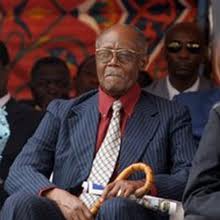
Félix Malloum Ngakoutou Bey-Ndi, better known as Félix Malloum, was a Chadian military officer and politician who served as the second President of Chad from 1975 to 1978.
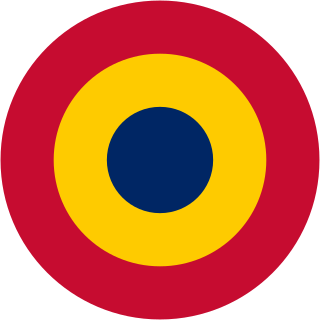
The Chadian Air Force is the aviation branch of the Chad National Army. It was formed in 1961 as the Chadian National Flight/Squadron.
The 1975 coup d'état in Chad that terminated Tombalbaye's government received an enthusiastic response in the capital N'Djamena. Félix Malloum emerged as the chairman of the new Supreme Military Council, and the first days of the new regime were celebrated as many political prisoners were released. His government included more Muslims from northern and eastern Chad, but ethnic and regional dominance still remained very much in the hands of southerners.
The Transitional Government of National Unity was the coalition government of armed groups that nominally ruled Chad from 1979 to 1982, during the most chaotic phase of the long-running civil war that began in 1965. The GUNT replaced the fragile alliance led by Félix Malloum and Hissène Habré, which collapsed in February 1979. GUNT was characterized by intense rivalries that led to armed confrontations and Libyan intervention in 1980. Libya intervened in support of the GUNT's President Goukouni Oueddei, against the former GUNT Defence Minister Hissène Habré.
The Armed Forces of the North was a Chadian rebel army active during the Chadian Civil War. Composed of FROLINAT units that remained loyal to Hissène Habré following his break from Goukouni Oueddei and the CCFAN in 1976. Consisting at first of only a few hundred Toubou and some Hajerai and Ouaddaïan fighters, FAN began its operations from bases in eastern Chad, where it received help from Sudan. Driven from N'Djamena back to its eastern refuge after the Libyan incursion of 1980, FAN scored a series of victories over Goukouni's Transitional Government of National Unity (GUNT) forces in 1982, which culminated in the recapture of N'Djamena and Habré's assumption of the presidency. FAN became the core of the new national army, Chadian National Armed Forces (FANT), in February 1983.
The Kano Accord was preceded by the collapse of central authority in Chad in 1979, when the Prime Minister, Hissène Habré, had unleashed his militias on February 12 against the capital N'Djamena and the sitting president, Félix Malloum. To tackle the President's forces, Habré had allied himself with the rival warlord Goukouni Oueddei, who entered N'Djamena on February 22 at the head of his People's Armed Forces (FAP).
Acyl Ahmat Akhabach (1944–1982) was a Chadian Arab rebel leader during the First Chadian Civil War. He was the head of the Democratic Revolutionary Council until his death in 1982, and served as the foreign minister of Chad under Goukouni Oueddei's government.
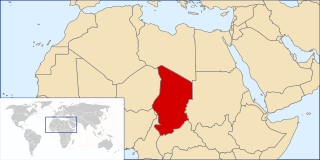
The Chadian–Libyan War was a series of military campaigns in Chad between 1978 and 1987, fought between Libyan and allied Chadian forces against Chadian groups supported by France, with the occasional involvement of other foreign countries and factions.

Operation Manta was a French military intervention in Chad between 1983 and 1984, during the Chadian–Libyan conflict. The operation was prompted by the invasion of Chad by a joint force of Libyan units and Chadian Transitional Government of National Unity (GUNT) rebels in June 1983. While France was at first reluctant to participate, the Libyan air-bombing of the strategic oasis of Faya-Largeau starting on July 31 led to the assembling in Chad of 3,500 French troops, the biggest French intervention since the end of the colonial era.
General Mahamat Nouri is a Chadian insurgent leader who currently commands the Union of Forces for Democracy and Development (UFDD). A Muslim from northern Chad, he began his career as a FROLINAT rebel, and when the group's Second Army split in 1976 he sided with his kinsman Hissène Habré. As Habré's associate he obtained in 1978 the first of the many ministerial positions in his career, becoming Interior Minister in a coalition government. When Habré reached the presidency in 1982, Nouri was by his side and played an important role in the regime.
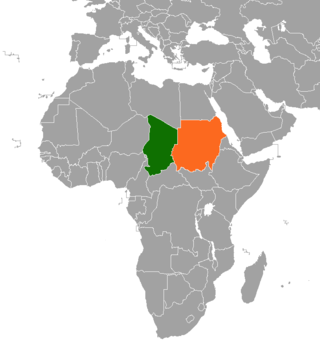
The populations of eastern Chad and western Sudan established social and religious ties long before either nation's independence, and these remained strong despite disputes between governments. In recent times, relations have been strained due to the conflict in Darfur and a civil war in Chad, which both governments accuse the other of supporting.
The National Union for Independence and Revolution was the ruling party in Chad between 1984 and 1990. It was founded in June 1984 by President Hissène Habré as a successor to his Armed Forces of the North, the insurgent group which Habré used to seize power in 1982. The party was banned after the 1990 coup d'état led by Idriss Déby.

The Chadian Civil War of 1965–1979 was waged by several rebel factions against two Chadian governments. The initial rebellion erupted in opposition to Chadian President François Tombalbaye, whose regime was marked by authoritarianism, extreme corruption, and favoritism. In 1975 Tombalbaye was murdered by his own army, and a military government headed by Félix Malloum emerged and continued the war against the insurgents. Following foreign interventions by Libya and France, the fracturing of the rebels into rival factions, and an escalation of the fighting, Malloum stepped down in March 1979. This paved the way for a new national government, known as "Transitional Government of National Unity" (GUNT).
The Claustre Affair was a hostage crisis during the First Chadian Civil War. Chadian rebels, calling themselves the Command Council of the Armed Forces of the North (CCFAN), led by Hissène Habré kidnapped Françoise Claustre, a French archaeologist, Marc Combe, a worker in a French development organization in Chad, and Christoph Staewen, a German doctor. Although Combe escaped and Staewen was ransomed back by the West German government, the rebels demanded a ransom of 10 million francs for Mrs. Claustre and her husband Pierre, who was later also captured by the rebels. The case garnered international attention, with the French sending a negotiator who was later executed. Finally the French appealed to Muammar Gaddafi to free the hostages, which he then did. The affair showcased Libya's growing influence in Central Africa.
The Second Battle of N'Djamena was a large scale and bloody battle during the Chadian-Libyan conflict. While initially fought between Chadian proxies, it eventually resulted in Libya's direct intervention, and was Gaddafi's first military victory in the conflict.







